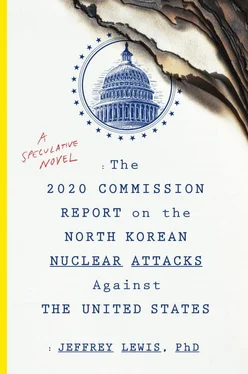Jeffrey Lewis - The 2020 Commission Report on the North Korean Nuclear Attacks Against the United States
Здесь есть возможность читать онлайн «Jeffrey Lewis - The 2020 Commission Report on the North Korean Nuclear Attacks Against the United States» весь текст электронной книги совершенно бесплатно (целиком полную версию без сокращений). В некоторых случаях можно слушать аудио, скачать через торрент в формате fb2 и присутствует краткое содержание. Город: New York, Год выпуска: 2018, ISBN: 2018, Издательство: Mariner Books, Жанр: Фантастика и фэнтези, Триллер, на английском языке. Описание произведения, (предисловие) а так же отзывы посетителей доступны на портале библиотеки ЛибКат.
- Название:The 2020 Commission Report on the North Korean Nuclear Attacks Against the United States
- Автор:
- Издательство:Mariner Books
- Жанр:
- Год:2018
- Город:New York
- ISBN:9-781-328-57391-9
- Рейтинг книги:4 / 5. Голосов: 1
-
Избранное:Добавить в избранное
- Отзывы:
-
Ваша оценка:
- 80
- 1
- 2
- 3
- 4
- 5
The 2020 Commission Report on the North Korean Nuclear Attacks Against the United States: краткое содержание, описание и аннотация
Предлагаем к чтению аннотацию, описание, краткое содержание или предисловие (зависит от того, что написал сам автор книги «The 2020 Commission Report on the North Korean Nuclear Attacks Against the United States»). Если вы не нашли необходимую информацию о книге — напишите в комментариях, мы постараемся отыскать её.
The 2020 Commission Report on the North Korean Nuclear Attacks Against the United States — читать онлайн бесплатно полную книгу (весь текст) целиком
Ниже представлен текст книги, разбитый по страницам. Система сохранения места последней прочитанной страницы, позволяет с удобством читать онлайн бесплатно книгу «The 2020 Commission Report on the North Korean Nuclear Attacks Against the United States», без необходимости каждый раз заново искать на чём Вы остановились. Поставьте закладку, и сможете в любой момент перейти на страницу, на которой закончили чтение.
Интервал:
Закладка:
The displacement of such a large group of people has had important long-term impacts. The most visible impacts are the total destruction of Manhattan and the relocation of federal government operations to the Mount Weather facility in Berryville, Virginia. The reconstruction of Manhattan, which is overseen by a public-benefit corporation, represents an enormous investment by the federal government, as well as New York State and New Jersey. Although the reconstruction has proceeded relatively smoothly, there are considerable doubts about when or whether financial and other industries will return to the city as reconstruction advances. It is more clear that federal government functions will eventually return to Washington, although when remains uncertain. Although the city of Washington itself was largely spared destruction, more than 80,000 federal jobs were located in northern Virginia and the area was home to more than 100,000 federal workers. It was simply not possible to sustain normal government operations in this environment, although reconstruction activities continue to be directed from offices in suburban Maryland. In Hawaii and Florida, too, the task of reconstruction has been daunting and, for many, the pace far too slow.
The tragedy of March 2020 is not, it should be noted, merely a Korean, Japanese, or American tragedy. Extraordinary amounts of black smoke from burning cities has led to a period of global cooling, which is almost certainly responsible for the recent rise in food prices around the world—which in turn is believed to be responsible for the famines that have struck Africa, South Asia, and China over the past few years. Global temperatures have fallen by an average 1.25 degrees Celsius in each of the past three years, resulting in shorter growing seasons. In the United States, corn and soybean production has fallen by an average of 10 percent from prewar levels, and continues to drop. There has also been a significant fall (20 percent) in Chinese middle-season rice production. The best estimates made available to the commission suggest that there are now around one billion people experiencing extreme food insecurity as a result of the cooling temperatures. The outbreaks of famine and disease throughout the developing world pose an important challenge for the reconstruction of Korea, Japan, and the United States.
There were successes during this period. The air and ground campaign executed by US Pacific Command in particular was effective and inspired. Although many Americans are understandably outraged by the failure to prevent the launch of thirteen nuclear-armed missiles against the US homeland, the air operation and subsequent ground invasion resulted in the near-total destruction of the North Korean army within less than forty-eight hours, with fewer than one hundred combat deaths for US forces. The campaign was largely a brilliantly executed improvisation. If the surprise nuclear attack by Kim Jong Un was a tactical victory, it was also a colossal strategic blunder that led to his downfall. This was, presumably, obvious to Kim as he sat beneath the mountains. According to a surviving aide, Kim could hear the sound of gunfire from US and South Korean special forces as they entered the underground complex in the moments before he took his own life.
There was also the incredible heroism of the many millions of Americans who ignored their own injuries that day to help others who were suffering. Strangers cared for one another. They rescued people from rubble, they bandaged wounds, they shared food and shelter. Sometimes there was nothing at all they could do except simply sit with a stranger so that person did not die alone. Their courage and sacrifice that day is an inspiration to us all and a reminder that we can, if we choose, act in the face of seemingly hopeless circumstances.
It is this spirit that the commissioners believe we must now bring to our most urgent task—reconstruction. In Korea, the success of the military operation to remove Kim Jong Un from power has opened the door to reunification of the Korean Peninsula. But both Korea and Japan—the world’s eleventh- and third-largest economies and major American trading partners—are in ruins. The cost of rebuilding our economies is immense. In the United States, these efforts are expected to cost $30 trillion to $40 trillion over the next decade—with the costs associated with rebuilding Manhattan alone estimated at between $15 trillion and $20 trillion. This is a formidable challenge that, above all, requires that our country come together and act with a unity of purpose.
Although the commissioners are mindful that many Americans believe that some officials should be held responsible for the course of events that led to the nuclear attacks against the United States, this would be a mistake. It would only serve to inflame partisan passions again, without bringing back the millions of dead. Although it is possible to disagree with specific decisions taken by senior officials, the commission found that they made the best decisions they could with the information that was available to them at the time. They acted in the same way that any senior official of any political party would, given the circumstances. It would be a mistake to politicize the tragic events of March 2020.
With President Trump’s decision not to seek reelection in November 2020, it is important to look forward, not backward. The president set an example for the nation when he announced that he would not run for reelection, sparing the country what would likely have been an extraordinarily divisive election following his impeachment and subsequent acquittal in the Senate on a party-line vote.
With President Pence’s election, the commission believes we now have an opportunity to turn the page on this terrible moment in our nation’s history. During the public hearings that this commission held throughout the country as part of our inquiry, all of us were astonished by the partisan animosity and recrimination on display. We were struck in particular by the lack of civility characterizing many of these discussions, and we found reprehensible the continuing assertions by many media figures and political partisans that the attacks were, in fact, conducted by federal government officials, such as the intelligence community, to discredit President Trump and his presidency. Though it should be plain enough, we feel compelled to say directly that there was no “deep state” conspiracy to explode nuclear weapons throughout the United States. There were no mass executions by Army and Army National Guard troops keeping order. There is no evidence that large numbers of Jews evacuated New York before the attacks. Kim Jong Un is not alive, nor is he living in Russia. And as their wounds and burns attest, the millions of survivors are not “crisis actors.” It is shocking to us to see that these opinions appear widespread and persistent online, as well as in many parts of the United States not directly affected by the attacks. They are false.
As noted at the beginning of this report, the members of this commission have been surprised by how many times they were asked one question in particular at these public hearings. While the answer to this question has been elusive, they feel it is important enough to mention it again in closing.
Should the United States seek the elimination of nuclear weapons? Some people believe that the large-scale destruction experienced by the United States is a powerful demonstration of the danger of nuclear weapons and that, as a society, we should commit ourselves to their elimination. These people believe that the United States should abandon its nuclear arms and join international legal agreements prohibiting the development, possession, and use of such weapons.
Others, however, disagree. They believe that North Korea’s large-scale use of nuclear weapons demonstrates that warfare, including nuclear warfare, remains a significant threat to the United States of America. Far from prohibiting nuclear weapons, these people believe that the United States must maintain a robust nuclear force to deter the sort of attacks launched by Kim Jong Un on the nation and its allies. The task of deterring another nuclear war, these skeptics argue, should take precedence over unrealistic efforts to prohibit these weapons.
Читать дальшеИнтервал:
Закладка:
Похожие книги на «The 2020 Commission Report on the North Korean Nuclear Attacks Against the United States»
Представляем Вашему вниманию похожие книги на «The 2020 Commission Report on the North Korean Nuclear Attacks Against the United States» списком для выбора. Мы отобрали схожую по названию и смыслу литературу в надежде предоставить читателям больше вариантов отыскать новые, интересные, ещё непрочитанные произведения.
Обсуждение, отзывы о книге «The 2020 Commission Report on the North Korean Nuclear Attacks Against the United States» и просто собственные мнения читателей. Оставьте ваши комментарии, напишите, что Вы думаете о произведении, его смысле или главных героях. Укажите что конкретно понравилось, а что нет, и почему Вы так считаете.












